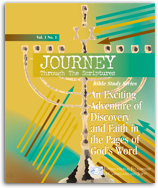
Journey Through The Scriptures
The Prophecy of Zechariah
Lesson 7: The Prophet’s Second Oracle
(Scripture to Read: Zechariah 12:1–14:21)
Zechariah’s prophecy concludes with a magnificent oracle depicting Israel in the glories of the Messianic age. Finally, the enemies of God and His people will be forever destroyed, and Israel will stand before the Lord as a cleansed and redeemed people. The completeness of the victory over Israel’s enemies is conveyed in vivid word pictures that include: Jerusalem as an “immovable rock” which injures anyone trying to dislodge it; panic and blindness among even the horses of Israel’s enemies; and the leaders of Israel consuming their enemies the way a raging fire devours wood. But in the midst of this fierce battle, God delivers and preserves Israel, the people of His delight and His covenant.
Chapter 13 speaks of the cleansing of the land and people of Israel, and the removal of all traces of idolatry from the nation. This purging of idolatry from Israel was accomplished by the Babylonian exile, for after the return Israel never again succumbed to the allure of worshiping the false gods of the nations around her. The final chapter of Zechariah is a marvelous foretelling of Messiah’s righteous and glorious reign. He will fight the final battle for His people, as in the day He fought against Egypt at the Red Sea—for this is how some Jewish commentators interpret the phrase “the day of battle” (14:3). Universal holiness will be the predominant characteristic of Messiah’s reign.
Study Questions
- Why does God say the feeblest person in Jerusalem will be like the mighty warrior David in the day of battle when Messiah delivers His people?
- What is the significance of Zechariah 13, coming as it does between the magnificent blessings and promises of chapters 12 and 14?
- Why are the Egyptians named as among those nations who will go to worship the God of Israel in Messiah’s day—and will suffer if they refuse (14:1819)?
- Why will even the cooking pots in Israel be inscribed with God’s holiness (14:21)?
Something to Think About
The biblical word for “holy” implies that which is set apart for the Lord, even if it is something as mundane and everyday as a cooking pot. This illustrates for us the importance of remembering that every aspect of our lives, and not just the “religious” portion, is to be lived for God’s glory.



